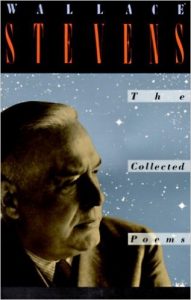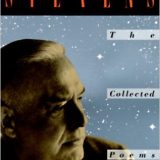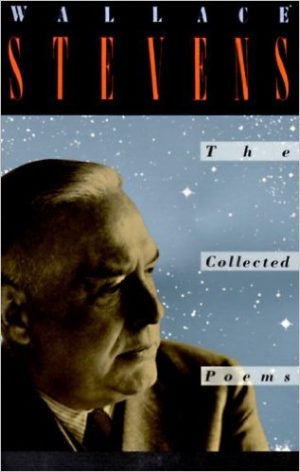Wallace Stevens – Collected Poems – 1954

Reviewed by: Michael Sympson Date: 9 October 2001
A shepherd of the language.
He will never be a popular poet in his nation. His beginnings did show more expertise than talent; the urge to spew message seemed irresistible:
“Like a dull scholar, I behold, in love, / An ancient aspect touching a new mind;” “Poetry is the supreme fiction, madame;” “Beauty is momentary in the mind -” if this would have been all he could do; nobody would care to remember him. But once his first lines took notice of “The exceeding brightness of this early sun …”
The poet had found his pace.
In his century, Wallace Stevens is one of the 5 leading poets native to America – I would rank him ahead of Marianne Moore, Hart Crane, T. S. Eliot and Ezra Pound as the breathless runner up. None of these people can hold the candle to W. H. Auden, but then, Auden was not a native. But how important is it anyway for a nation to have great poets to her credit? Judged by the reception of poetry in America, not very much. I know people who take courses in creative writing, because they come cheaper than a therapist.
To be a poet in troubled times is never easy, and the 20th century was a watershed between the cultural paradigms. Poetry is a pagan instinct, a last line of defence of the old idols – maybe it has really run its course. But then language still needs its shepherds to protect it from the stench and spill of modern journalese and “messages from our sponsor,” and new poems, waiting to be discovered, are still floating in that haze of unborn dreams, that is shrouding our planet. Over the years, Stevens became a very conscientious shepherd:
A few things for themselves, / Convolvulus and coral, / Buzzards and live-moss, / Tiestas from the keys, / A few things for themselves, / Florida, venereal soil, / Disclose to the lover. // The dreadful sundry of this world, / The Cuban, Polodowsky, / The Mexican women, / The Negro undertaker / Killing the time between corpses / Fishing for crayfish… / Virgin of boorish births, // Swiftly in the nights, / In the porches of Key West, / Behind the bougainvilleas, / After the guitar is asleep, / Lasciviously as the wind, / You come tormenting, / Insatiable, // When you might sit, / A scholar of darkness, / Sequestered over the sea, / Wearing a clear tiara / Of red and blue and red, / Sparkling, solitary, still, / In the high sea-shadow. // Donna, donna, dark, / Stooping in indigo gown / And cloudy constellations, / Conceal yourself or disclose / Fewest things to the lover — / A hand that bears a thick-leaved fruit, / A pungent bloom against your shade.
Or:
I. Complacencies of the peignoir, and late / Coffee and oranges in a sunny chair, / And the green freedom of a cockatoo / Upon a rug mingle to dissipate / The holy hush of ancient sacrifice. / She dreams a little, and she feels the dark / Encroachment of that old catastrophe, / As a calm darkness among water-lights. / The pungent oranges and bright, green wings / Seem things in some procession of the dead, / Winding across wide water, without sound. / The day is like wide water, without sound, / Stilled for the passing of her dreaming feet / Over the seas, to silent Palestine, / Dominion of the blood and sepulchre.
II. Why should she give her bounty to the dead? / What is divinity if it can come / Only in silent shadows and in dreams? / Shall she not find in comforts of the sun, / In pungent fruit and bright, green wings, or else / In any balm or beauty of the earth, / Things to be cherished like the thought of heaven? /Divinity must live within herself: / Passions of rain, or moods in falling snow; / Grievings in loneliness, or unsubdued / Elations when the forest blooms; gusty / Emotions on wet roads on autumn nights; / All pleasures and all pains, remembering / The bough of summer and the winter branch. / These are the measures destined for her soul. …” […]
VI. “Is there no change of death in paradise? / Does ripe fruit never fall? Or do the boughs / Hang always heavy in that perfect sky, / Unchanging, yet so like our perishing earth, / With rivers like our own that seek for seas / They never find, the same receding shores / That never touch with inarticulate pang? / Why set the pear upon those river-banks / Or spice the shores with odors of the plum? / Alas, that they should wear our colors there, / The silken weavings of our afternoons, / And pick the strings of our insipid lutes! / Death is the mother of beauty, mystical, / Within whose burning bosom we devise / Our earthly mothers waiting, sleeplessly. …” […]
It seems Stevens’ gift to America is a last sanctuary for language and meditation … so far!
Michael Sympson

















